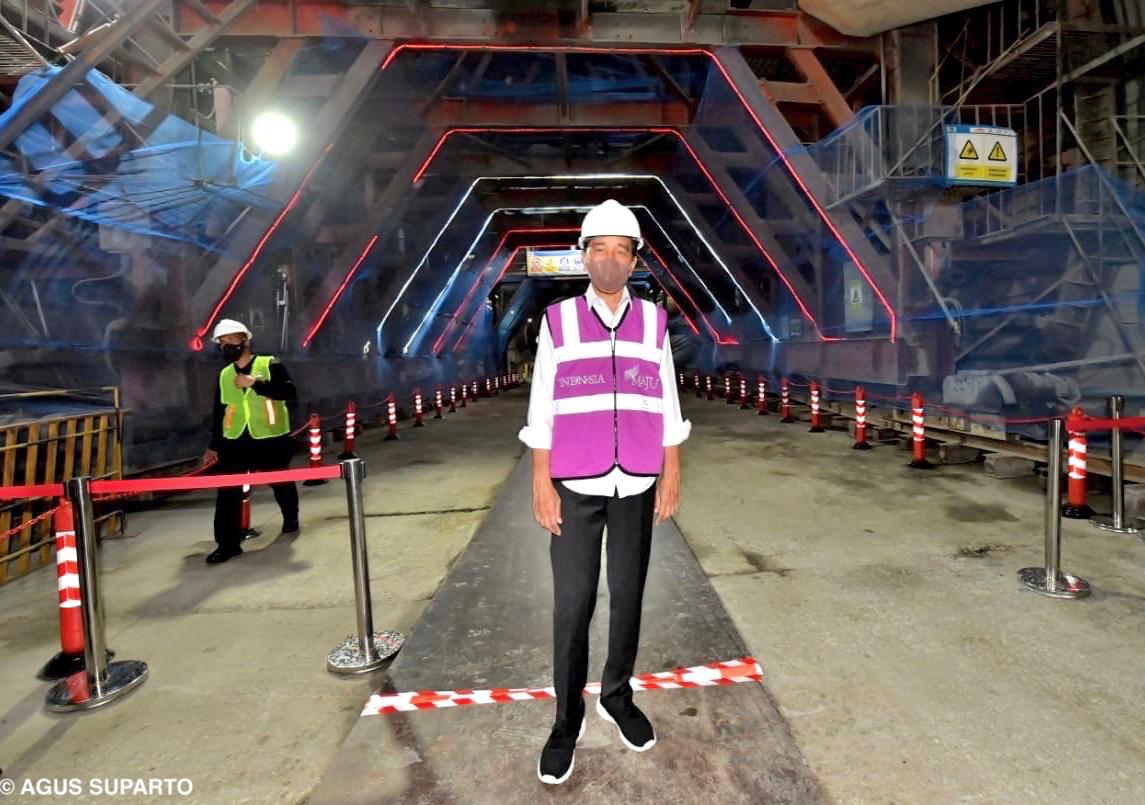ID :
619732
Tue, 01/18/2022 - 05:55
Auther :
Shortlink :
https://www.oananews.org//node/619732
The shortlink copeid
Jakarta-Bandung high-speed railway progresses by 79.9 percent: Jokowi

Jakarta, January 18 (ANTARA) - Development of the Jakarta-Bandung high-speed railway project has reached 79.9-percent completion and is targeted to become operational by June 2023, according to President Joko Widodo (Jokowi).
"So far, work on 79.9 percent of the Jakarta-Bandung high-speed train project has been completed. We expect to test it by the end of 2022 to be operated in June 2023,” Jokowi noted while inspecting tunnel 2 for the Jakarta-Bandung high-speed rail (KCJB) project in Purwakarta District, West Java, on Monday (Jan 17).
Jokowi inspected the progress in construction of the KCJB along with Coordinating Minister for Maritime Affairs and Investment Luhut Binsar Panjaitan, Cabinet Secretary Pramono Anung, West Java Governor Ridwan Kamil, President Director of PT Kereta Cepat Indonesia China (KCIC) Dwiyana Slamet Riyadi, and other relevant officials.
During his visit, Jokowi reviewed the technical problems encountered in tunnel 2 of the project.
"Based on information on the field, progress in the work at tunnel 2 is running slowly because of the type of soil in the area. Being here requires careful work," he emphasized.
Jokowi is optimistic that the Jakarta-Bandung high-speed train would reduce traffic congestion in the two cities.
"We are optimistic that this project would reduce congestion both in Jakarta and in Bandung as well as accelerate the mobility of people and goods. We are optimistic that this would offer a good competitive advantage for our country," Jokowi remarked.
The Jakarta-Bandung high-speed train will use the latest generation of CR400AF train cars. The project has a track length of 142.3 kilometers from Jakarta to Bandung.
The train will stop at Halim, Karawang, Padalarang, and Tegalluar stations. Each station will be integrated with modes of mass transportation in each region.
Of the total length of the high-speed rail lines, over 80 kilometers have elevated structures, while the rest are 13 tunnels and subgrades.
Several temporary facilities, such as a batching plant and casting yard, were built at several critical points to expedite the construction process.
The cost of building the rail for this high-speed train increased to US$1.9 billion, or around Rp26.7 trillion.
According to the KCIC estimation, the project's cost overruns in engineering, procurement, and construction (EPC) reached some US$0.6 billion-1.6 billion; land acquisition, $0.3 billion; financing costs, $0.2 billion; headquarters and pre-operations, $0.2 billion; and other costs, $0.05 billion.
Earlier, the initial cost structure of the Jakarta-Bandung high-speed rail project comprised $4.80 billion for EPC, $0.16 billion for HSR management and consultants, $0.80 billion for land acquisition, financing costs reaching $0.2 billion, while $0.03 billion for headquarters and pre-operations, and other costs reaching $0.01 billion.
Meanwhile, the project funding structure totalling $6.07 billion came from the China Development Bank (CDB) loan of $4.55 billion and equity worth $1.52 billion comprising the equity of PT Pilar Sinergi BUMN Indonesia (PSBI) worth $0.91 billion and the Chinese consortium equity of $0.61 billion.
As a result of this increase in budget, the government decided to intervene in the Jakarta-Bandung high-speed rail project by utilizing the State Budget (APBN).
The government and Commission XI of the House of Representatives (DPR) have approved the addition of State Equity Participation (PMN) in 2021 and the 2022 allocation for PT KAI (Persero), with Rp4.3 trillion for the base quality requirements of the Jakarta-Bandung high-speed rail project.





